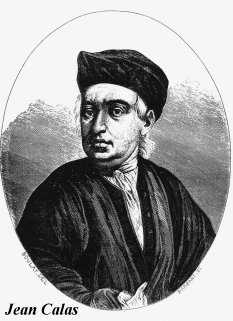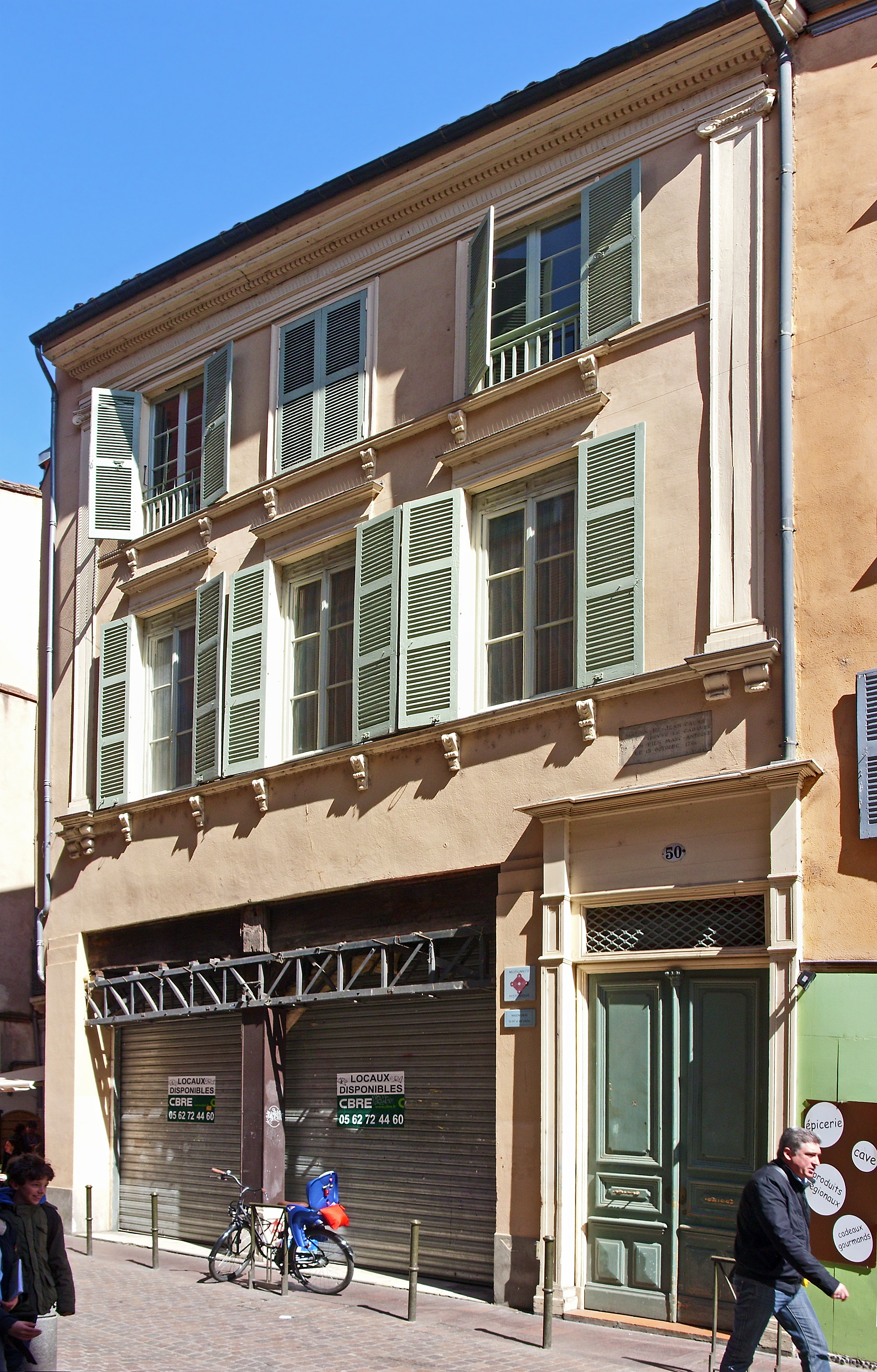Jean Calas on:
[Wikipedia]
[Google]
[Amazon]
 Jean Calas (1698 – 10 March 1762) was a merchant living in
Jean Calas (1698 – 10 March 1762) was a merchant living in

 On 13–14 October 1761, another of the Calas sons, Marc-Antoine, was found dead on the ground floor of the family's home. Rumors had it that Jean Calas had killed his son because he intended to convert to Catholicism. When interrogated, the family initially claimed that Marc-Antoine had been killed by a murderer. Then they declared that they had found Marc-Antoine dead, hanged; because
On 13–14 October 1761, another of the Calas sons, Marc-Antoine, was found dead on the ground floor of the family's home. Rumors had it that Jean Calas had killed his son because he intended to convert to Catholicism. When interrogated, the family initially claimed that Marc-Antoine had been killed by a murderer. Then they declared that they had found Marc-Antoine dead, hanged; because
l'Affaire Calas
(in French) *
''Traité sur la Tolérance à l'occasion de la mort de Jean Calas''
(in French) * :fr:Affaire Calas {{DEFAULTSORT:Calas, Jean 1698 births 1762 deaths 1762 in Christianity 18th-century executions by France 18th-century French people Executed French people History of Catholicism in France History of Toulouse Huguenots People executed by breaking wheel People executed by the Ancien Régime in France
 Jean Calas (1698 – 10 March 1762) was a merchant living in
Jean Calas (1698 – 10 March 1762) was a merchant living in Toulouse
Toulouse ( , ; oc, Tolosa ) is the prefecture of the French department of Haute-Garonne and of the larger region of Occitania. The city is on the banks of the River Garonne, from the Mediterranean Sea, from the Atlantic Ocean and fr ...
, France, who was tried, tortured and executed for the murder of his son, despite his protestations of innocence. Calas was a Protestant
Protestantism is a Christian denomination, branch of Christianity that follows the theological tenets of the Reformation, Protestant Reformation, a movement that began seeking to reform the Catholic Church from within in the 16th century agai ...
in an officially Catholic
The Catholic Church, also known as the Roman Catholic Church, is the largest Christian church, with 1.3 billion baptized Catholics worldwide . It is among the world's oldest and largest international institutions, and has played a ...
society. Doubts about his guilt were raised by opponents of the Catholic Church and he was exonerated in 1764. In France, he became a symbolic victim of religious intolerance
Religious intolerance is intolerance of another's religious beliefs or practices or lack thereof.
Mere statements which are contrary to one's beliefs do not constitute intolerance. Religious intolerance, rather, occurs when a group (e.g., a so ...
, along with François-Jean de la Barre
François-Jean Lefebvre de la Barre (12 September 17451 July 1766) was a young French nobleman. He was tortured and beheaded before his body was burnt on a pyre along with Voltaire's ''Philosophical Dictionary'' nailed to his torso. La Barre i ...
and Pierre-Paul Sirven.
Background
Calas, along with his wife, was a Protestant. France was then a Catholic country; Catholicism was the state religion, with no legal right for individuals to practice different faiths. While the harsh oppression of Protestantism initiated by KingLouis XIV
Louis XIV (Louis Dieudonné; 5 September 16381 September 1715), also known as Louis the Great () or the Sun King (), was List of French monarchs, King of France from 14 May 1643 until his death in 1715. His reign of 72 years and 110 days is the Li ...
had largely receded, Protestants were, at best, tolerated. Louis, one of Calas' sons, converted to Catholicism in 1756.
Death of Marc-Antoine Calas
left, The arrest of Calas.
 On 13–14 October 1761, another of the Calas sons, Marc-Antoine, was found dead on the ground floor of the family's home. Rumors had it that Jean Calas had killed his son because he intended to convert to Catholicism. When interrogated, the family initially claimed that Marc-Antoine had been killed by a murderer. Then they declared that they had found Marc-Antoine dead, hanged; because
On 13–14 October 1761, another of the Calas sons, Marc-Antoine, was found dead on the ground floor of the family's home. Rumors had it that Jean Calas had killed his son because he intended to convert to Catholicism. When interrogated, the family initially claimed that Marc-Antoine had been killed by a murderer. Then they declared that they had found Marc-Antoine dead, hanged; because suicide
Suicide is the act of intentionally causing one's own death. Mental disorders (including depression, bipolar disorder, schizophrenia, personality disorders, anxiety disorders), physical disorders (such as chronic fatigue syndrome), and ...
was considered a heinous crime against oneself, and the dead bodies of suicides were defiled, they had arranged for their son's suicide to look like a murder.
Trial and execution
Despite Jean Calas claiming that the death was a suicide, and the testimony of Jeanne Vigneire, Calas' Catholic governess, the court in Toulouse held that Jean Calas had murdered his son. Calas was also sentenced to be tortured after being judged and found guilty. His arms and legs were stretched until they were pulled out of their sockets. Thirty pints (more than 17 litres) of water were poured down his throat. He was tied to a cross in the cathedral square where each of his limbs were broken twice by an iron bar. Even with all this torture, he continued to declare his innocence. On 9 March 1762 the '' parliament of Toulouse'' (regional court) of Toulouse sentenced Jean Calas to death on the wheel. On 10 March, at the age of 64, he died tortured on the wheel, while still firmly claiming his innocence.Voltaire's intervention and posthumous exoneration
French philosopherVoltaire
François-Marie Arouet (; 21 November 169430 May 1778) was a French Enlightenment writer, historian, and philosopher. Known by his '' nom de plume'' M. de Voltaire (; also ; ), he was famous for his wit, and his criticism of Christianity—e ...
was contacted about the case, and after initial suspicions that Calas was guilty of anti-Catholic fanaticism were dispelled by his allegations, he began a campaign to get Calas' sentence overturned, claiming that Marc-Antoine had committed suicide because of gambling debts and not being able to finish his university studies due to his denomination.
Voltaire's efforts were successful, and King Louis XV
Louis XV (15 February 1710 – 10 May 1774), known as Louis the Beloved (french: le Bien-Aimé), was King of France from 1 September 1715 until his death in 1774. He succeeded his great-grandfather Louis XIV at the age of five. Until he reache ...
received the family and had the sentence annulled in 1764. The king fired the chief magistrate of Toulouse, the Capitoul, the trial was done over, and in 1765 Jean Calas posthumously was exonerated
Exoneration occurs when the conviction for a crime is reversed, either through demonstration of innocence, a flaw in the conviction, or otherwise. Attempts to exonerate convicts are particularly controversial in death penalty cases, especially w ...
on a "vice de procedure", not on the original charges, with the family paid 36,000 livres by the king in compensation. Voltaire, an outspoken critic of the Catholic church, cited the instance as an example of the church's severity in his 1763 work ''Treatise on Tolerance
The ''Treatise on Tolerance on the Occasion of the Death of Jean Calas from the Judgment Rendered in Toulouse'' (''Traité sur la tolérance'') is a work by French philosopher Voltaire, published in 1763, in which he calls for religious toleration ...
''.
References
External links
l'Affaire Calas
(in French) *
Voltaire
François-Marie Arouet (; 21 November 169430 May 1778) was a French Enlightenment writer, historian, and philosopher. Known by his '' nom de plume'' M. de Voltaire (; also ; ), he was famous for his wit, and his criticism of Christianity—e ...
'''Traité sur la Tolérance à l'occasion de la mort de Jean Calas''
(in French) * :fr:Affaire Calas {{DEFAULTSORT:Calas, Jean 1698 births 1762 deaths 1762 in Christianity 18th-century executions by France 18th-century French people Executed French people History of Catholicism in France History of Toulouse Huguenots People executed by breaking wheel People executed by the Ancien Régime in France